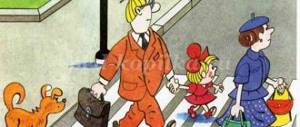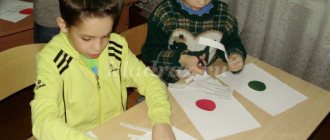Game around the stations "Around the World"
Municipal budgetary educational institution Chanovskaya secondary school No. 2, Chanovsky district, Novosibirsk region
Game around the stations "Around the World"
Gorbacheva Alexandra Anatolevna,
teacher - psychologist
Explanatory note
A game
- this is a huge bright window through which a life-giving stream of ideas and concepts about the surrounding world flows into the child’s spiritual world. Play is the spark that ignites the flame of inquisitiveness and curiosity. (Sukhomlinsky V.A.) However, the older children become, the more difficult it is to get them involved in play activities. A win-win option for high school students is playing by stations.
Relevance
conducting a game at the “Around the World” stations is that the teacher in an informal setting can test not only the knowledge and skills of the children, but also identify the level of cohesion of the children’s team and the ability to negotiate in the process of solving assigned tasks. At the same time, playing at stations gives each student the opportunity to express themselves as a creative person. This game can be played not only during school hours, but also during the summer holidays at a school camp.
Target:
To develop the intellectual sphere of students, ingenuity, observation, speed of reaction, eye, courage.
Tasks:
Formation of skills for joint activities in a group, unity of group members.
Development of the ability of emotional self-regulation.
Create a joyful mood and pleasure from communicating with peers.
To cultivate friendly mutual assistance, confidence, perseverance, determination, a sense of teamwork, and empathy.
Age group:
students from grades 6 to 11.
Features of team formation: From each grade from 6 to 11, a team of 8 participants is nominated; the team independently chooses its captain and comes up with a name.
Conditions of the game.
Each team receives its own route sheet, which indicates the travel plan for the stations, and an evaluation sheet. According to the route sheet, children are sent to their stations. Having arrived at the station, the teams complete tasks that are scored in points. At stations where the task is performed for a time, the result is evaluated after completing the entire route. The team that completes it in the least amount of time is scored 10 points, the rest are given points that decrease according to the increase in time. At the end of the game, the results are summed up and a summary table of the journey by station is compiled. Awards at the line of winners and participants.
1 station “Delicious alphabet”
This station is located on the stairs. Team members draw a card with a letter of the alphabet and must name a fruit, vegetable or berry with that letter. Having completed this task, the team moves up one step. If a team doesn't know the answer, they draw another card and move on, but with a penalty point.
Evaluation of the team based on the result of passing the test, the total number of steps is 12 pieces, if the task is completed flawlessly, then the team receives 12 points, for each additional card a penalty point.
Inventory:
alphabet cards
Station 2 “Super speed”
The essence of the task at this station is to quickly assemble puzzles from two different fairy tales that are mixed together.
Inventory:
stopwatch, puzzles 2 pcs.
3 station “Find out”
The essence of the task at this station is to recognize teachers from children's photographs. The number of photos that are guessed is how many points the team gets.
Inventory:
children's photographs of teaching staff.
4 station “I trust”
At this station, each participant must, turning his back to the team, fall into the arms of his comrades. The number of points the team receives is how many people complete the task.
5th station “Collect-ka”
The essence of the task at this station is to sort the markers with caps by color, against time.
Inventory:
stopwatch, 10 markers
Station 6 “Memorize and Draw”
At this station, children are asked to test their visual memory. In 10 seconds, participants study the task card and try to remember all the objects depicted on it and their quantity. Then reproduce what you saw from memory. The number of items that match is how many points the team gets.
Inventory:
card with pictures of different objects
7 station “Mysterious Bridge”
Skittles are placed in front of the children, the team's task is to choose two participants, one of whom is blindfolded and, under the guidance of his friend, listening to the commands (left, right, straight) must go through the obstacles. Evaluation of the team based on the result of passing the test, the total number of pins is 8 pieces, if the task is completed flawlessly, then the team receives 8 points, for each pin knocked down a penalty point.
8 station "Constructor"
At this station, children are asked to make as many words as possible from the word “POTATO.” How many words are composed, the team receives so many points.
9 station "Understand me"
At this station, children are provided with worksheets. Using facial expressions and gestures, depict what is written, and the team must guess. How many situations are guessed, the team receives so many points.
List of situations:
A man eats ice cream. A man eats long pasta. Fry eggs. A man eats a tasteless kebab. Knead the dough and make pies. Thread the needle and sew. Take money out of your wallet and count it. Pack things in a suitcase. Kindle Fire. A man eats a sweet watermelon.
Summarizing:
Game over. The children received a lot of positive emotions. During the game, the guys showed their ingenuity and observation, determination and sense of teamwork. The most important thing is that the children enjoyed communicating with their peers. Created a joyful mood for the whole day. Consequently, the assigned tasks have been fully realized. All participating teams were awarded certificates at the school-wide awards ceremony.
List of used literature
1. Ageev E.S. Intergroup interaction. - M., Moscow University Publishing House, 1990 2. Gozman L.Ya. Psychology of emotional relationships. M., Publishing house Mosk. University, 1987 3. Smith R. “Group work with children and adolescents.” M., “Genesis”, 1999 4. Filipenko E. V. . «
Fun holidays: games and competitions at school and country camp" Yaroslavl: Development Academy, 2005





